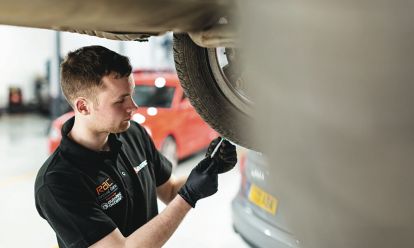We have all either stepped into a vehicle, or been driving along the road, and caught a whiff of something unpleasant or concerning. From burning clothes and plastic, to the smell of damp or rotten egg – there are multiple reasons why it could be happening.
This guide looks at what they could be and how you can resolve any issues.
Are you experiencing a car fault, warning, or mechanical problem on your road trip? Find a local mechanic with the RAC.
New car smell
First of all, not all car smells are indicative of a potential issue or enough to disgust you or your passengers.
When you purchase a new vehicle there is a smell that many enjoy.
After a vehicle is finished on the production line and either sent to a customer or to a dealership, the interior is made up of a range of new, polished, and chemically cleaned products.
It is this combination that can be attributed to the ‘new car smell’.
Known as ‘off-gassing’ – it is the smell of the plastics, leather, fabrics, and adhesives (along with the other new parts) setting into place. These include volatile organic compounds (VOCs) and although they are not immediately harmful, continued exposure can cause minor health concerns.
This is where the new car smell can actually put a lot of people off. Due to the overbearing chemical smell, may new car owners try to find various ways to eliminate the aroma.
However, for fans of the smell, many motor industry retailers have now started to sell ‘new car smell’ as a scent of air fresheners. This is so those drivers can relive those first few months of owning a brand new vehicle.
Car burning smell
If you are driving along and are suddenly hit with a warm waft that smells like something is burning, then your car could have a serious problem.
Should this happen, it will indicate that you have a burnt out fuse, the air conditioning unit has overheated, or maybe your brake pads have worn down and need replacing immediately.
It could also indicate that two parts of the car are rubbing against each other, causing large amount of heat and friction – and should be addressed as soon as possible.
Before you set off, make sure you have topped up all your fluids and engine coolant in the car. This can make sure it doesn’t overheat – which can cause a burning smell.
The best course of action is to visit a local garage or call for a mobile mechanic to check over your vehicle, so it is safe to return to the roads.
In more serious examples, a burning smell could indicate that a fire has started in your vehicle. Look out for some smoke – and exit the vehicle immediately and call 999.
Rubber burning smell
Although there are various reasons why you could smell burning inside a vehicle – the aroma of burning rubber is very distinctive.
It is a sign that your brakes or tyres have an issue – and could indicate that the clutch is slipping or not working correctly.
Allow the car to cool down and then check the tyre tread and tyre pressure. However, checking your brake pads are very important when determining where the smell of burning rubber is coming from.
Often when there is a smell of burning rubber, you may also hear your brakes squeaking.
If the issue persists, then speak to a mechanic.
Stay on top of tyre safety throughout the year to help avoid this issue.
Air conditioning smell
Would you say you have smelly car air conditioning? Then it could indicate that there are several potential problems with your vehicle.
Common issues include fluid leaks in the air con unit itself that may have also led to electrical faults.
Throughout the year, you’re A/C unit may have had a build-up of mould and bacteria that you are then circulating around your vehicle when you turn it on.
Modern vehicles come with a lot of tech. When these brake or have problems, they can give off bad smells that can then be pumped through the vents into the car.
On rare occasions, you may have even had an animal infestation in your vehicle!
The best way to avoid this is to regularly recharge your air conditioning every two years – or more if you regularly use it. This ensures that the system is working properly and isn’t pumping out harmful gasses. When this happens, the mechanic will also carry out some ant0-bacterial cleaning.
Musty car smell
Should you open your car door and be hit with a musty scent, then it is likely that you have a leak in your vehicle where water has accumulated.
Over time this will lead to humidity and moisture spreading across the car – leading to the unpleasant smell.
Regularly cleaning your car and do your pre-journey checks will help notice this before it becomes a serious problem.
However, this might not be enough as some parts of the vehicle naturally wear down over time and can be the culprit for the smell.
Often the various seals for your windscreen, doors, bonnet, and boot can be areas where water can build up, causing the musty smell.
This unpleasant aroma may also happen after a wet day when people and pets have entered the vehicle and the water hasn’t evaporated. Regular cleaning should avoid this. Also, remove any mats or covers and dry them before putting them back in the car.
Anti-bacterial wipes and sprays will also remove any mould or bacteria that has built up in these areas.
Clutch burning smell
Almost every car owner has experienced this at some point in their life.
This happens when a driver is riding their clutch, which produces a distinctive burning smell – similar to burning rubber.
It can also happen over a longer period of time, where the clutch plate has suffered from prolonged periods of wear and tear.
You can often smell other cars burnt clutches in slow moving traffic or when cars are stuck on steep inclines.
The smell should only last a few minutes and should only be seen by a specialist if it continues for a longer period of time, or you can feel the car being impacted when changing gear.
You may also smell a burning clutch if your slips out of the gear its in while driving. This means that it should be seen by a mechanic and replaced.
READ MORE: Clutch repair
Burning plastic smell
The smell of burning plastic can be nauseating and cause distress – so knowing what is causing it and how to fix it is important.
It can mean that another part of the vehicle is touching the exhaust and is melting the plastic. This can also happen if something plastic becomes loose in the engine and falls into a place where extreme heat is generated.
However, a common cause can be worn out brake pads or brand new ones that haven’t been used yet. Should it be that they have become so thin that they no longer work properly, get them replaced.
If they are new, then open your windows and let the fumes out – the smell should disappear in minutes if you repeatedly lightly tap the brakes.
In other parts of the vehicle there is plastic insulation. If this comes in contact with a hot engine – or even when it’s a very hot day – you will catch a scent or melting plastic. Over time, this could lead to a place where water can leak into – causing a musty smell in the autumn or winter seasons.

Cheaper than AA or we’ll beat by 20%^
• Roadside cover from £5.49 a month*
• We get to most breakdowns in 60 mins or less
• Our patrols fix 4/5 breakdowns on the spot

Fuel smell
This is as simple as it sounds. There is a leak from your fuel system into another part of your vehicle.
Sometimes the smell may linger if you have recently filled up your fuel tank – but this should dissipate after a few minutes.
In modern vehicles, there are fuel injectors and advanced safety technology features that make this issue very rare.
Fumes from fuel can be very dangerous – visit a garage immediately.
Rotten egg smell
A very sickening aroma and something that would put off any passenger – the smell of rotten egg is a sign of a serious problem in your vehicle.
All problems where you can smell rotten eggs should be addressed by a professional mechanic as soon as possible.
There may be an issue with the catalytic converter, fuel pressure regulator, fuel filter, fuel injector, or your vehicle may have old transmission fluid.
Damp car smell
If your vehicle has a leak where water can collect, or has poor ventilation, then over time it will lead to bacteria, mould, and fungus growing in your vehicle – which emits a damp and musty smell.
They then release spores in the air which can be detrimental to your health over a prolonged period of time.
Anti-bacterial and anti-mildew solutions will clear this up. But staying on top of cleaning your car and removing damp mats or items of clothing will stop any build-up of damp.
Do electric cars have a different ‘new car smell’?
As technology evolves and electric vehicles become more prominent on UK roads, drivers are searching to see how best to maintain their EV.
Electric cars are largely made up of the same materials regarding the interior of the vehicle – and so they have the same ‘new car smell’.
The only difference is that they will not suffer from fuel smells!
How to get rid of a car smell
If you have a smelly car, then there are a few simple things you can do.
- Regularly clean your car
- Take your vehicle to be professionally cleaned if the issue persists
- Remove unnecessary items
- Keep anti-bacterial wipes and cleaning products in the car to quickly remove any spills or dirt
- Regular maintenance checks
- If you are unsure – visit a local garage or call a mobile mechanic
- Use air fresheners
- Top up all your fluids
- Crack open a window to get fresh air in the vehicle
- Regularly use your air conditioning to check it works and has no issues
Do you have any other tips? Leave them in the comments below.
Service, repair or MOT?
You can trust the RAC with our local approved garages and NEW mobile mechanics.












